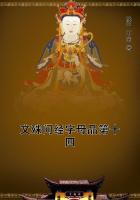"Nay, Juno's self, whose wild alarms Set ocean, earth, and heaven in arms, Shall change for smiles her moody frown, And vie with me in zeal to crown Rome's sons, the nation of the gown.So stands my will.There comes a day, While Rome's great ages hold their way, When old Assaracus's sons Shall quit them on the myrmidons, O'er Phthia and Mycenae reign, And humble Argos to their chain."(4)Which things, indeed, Virgil makes Jupiter predict as future, whilst, in reality, he was only himself passing in review in his own mind, things which were already done, and which were beheld by him as present realities.But I have mentioned them with the intention of showing that, next to liberty, the Romans so highly esteemed domination, that it received a place among those things on which they bestowed the greatest praise.Hence also it is that that poet, preferring to the arts of other nations those arts which peculiarly belong to the Romans, namely, the arts of ruling and commanding, and of subjugating and vanquishing nations, says, "Others, belike, with happier grace, From bronze or stone shall call the face, Plead doubtful causes, map the skies, And tell when planets set or rise; But Roman thou, do thou control The nations far and wide; Be this thy genius, to impose The rule of peace on vanquished foes, Show pity to the humble soul, And crush the sons of pride."(5)These arts they exercised with the more skill the less they gave themselves up to pleasures, and to enervation of body and mind in coveting and amassing riches, and through these corrupting morals, by extorting them from the miserable citizens and lavishing them on base stage-players.Hence these men of base character, who abounded when Sallust wrote and Virgil sang these things, did not seek after honors and glory by these arts, but by treachery and deceit.Wherefore the same says, "But at first it was rather ambition than avarice that stirred the minds of men, which vice, however, is nearer to virtue.For glory, honor, and power are desired alike by the good man and by the ignoble; but the former," he says, "strives onward to them by the true way, whilst the other, knowing nothing of the good arts, seeks them by fraud and deceit."(1) And what is meant by seeking the attainment of glory, honor, and power by good arts, is to seek them by virtue, and not by deceitful intrigue; for the good and the ignoble man alike desire these things, but the good man strives to overtake them by the true way.The way is virtue, along which he presses as to the goal of possession--namely, to glory, honor, and power.Now that this was a sentiment engrained in the Roman mind, is indicated even by the temples of their gods; for they built in very close proximity the temples of Virtue and Honor, worshipping as gods the gifts of God.Hence we can understand what they who were good thought to be the end of virtue, and to what they ultimately referred it, namely, to honor;for, as to the bad, they had no virtue though they desired honor, and strove to possess it by fraud and deceit.Praise of a higher kind is bestowed upon Cato, for he says of him "The less he sought glory, the more it follOwed him."(2) We say praise of a higher kind; for the glory with the desire of which the Romans burned is the judgment of men thinking well of men.And therefore virtue is better, which is content with no human judgment save that of one's own conscience.Whence the apostle says, "For this is our glory, the testimony of our conscience."(3) And in another place he says, "But let every one prove his own work, and then he shall have glory in himself, and not in another."(4) That glory, honor, and power, therefore, which they desired for themselves, and to which the good sought to attain by good arts, should not be sought after by virtue, but virtue by them.For there is no true virtue except that which is directed towards that end in which is the highest and ultimate good of man.Wherefore even the honors which Cato sought he ought not to have sought, but the state ought to have conferred them on him unsolicited, on account of his virtues.
But, of the two great Romans of that time, Cato was he whose virtue was by far the nearest to the true idea of virtue.Where-fore, let us refer to the opinion of Cato himself, to discover what was the judgment he had formed concerning the condition of the state both then and in former times."I do not think," he says, "that it was by arms that our ancestors made the republic great from being small.Had that been the case, the republic of our day would have been by far more flourishing than that of their times, for the number of our allies and citizens is far greater; and, besides, we possess a far greater abundance of armor and of horses than they did.But it was other things than these that made them great, and we have none of them: industry at home, just government without, a mind free in deliberation, addicted neither to crime nor to lust.Instead of these, we have luxury and avarice, poverty in the state, opulence among citizens; we laud riches, we follow laziness; there is no difference made between the good and the bad; all the rewards of virtue are got possession of by intrigue.And no wonder, when every individual consults only for his own good, when ye are the slaves of pleasure at home, and, in public affairs, of money and favor, no wonder that an onslaught is made upon the unprotected republic."(5)He who hears these words of Cato or of Sallust probably thinks that such praise bestowed on the ancient Romans was applicable to all of them, or, at least, to very many of them.It is not so; otherwise the things which Cato himself writes, and which I have quoted in the second book of this work, would not be true.















